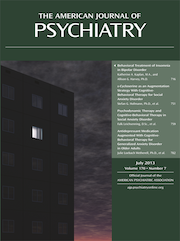Childhood Trauma and Psychosis in a Prospective Cohort Study: Cause, Effect, and Directionality
Abstract
Objective
Using longitudinal and prospective measures, the authors assessed the relationship between childhood trauma and psychotic experiences, addressing the following questions: 1) Does exposure to trauma predict incident psychotic experiences? 2) Does cessation of trauma predict cessation of psychotic experiences? 3) What is the direction of the relationship between childhood trauma and psychotic experiences?
Method
This was a nationally representative prospective cohort study of 1,112 school-based adolescents 13–16 years of age, assessed at baseline and at 3-month and 12-month follow-ups for childhood trauma (physical assault and bullying) and psychotic experiences.
Results
A bidirectional relationship was observed between childhood trauma and psychosis, with trauma predicting psychotic experiences over time and vice versa. However, even after accounting for this bidirectional relationship with a number of strict adjustments (only newly incident psychotic experiences occurring over the course of the study following exposure to traumatic experiences were examined), trauma was strongly predictive of psychotic experiences. A dose-response relationship was observed between severity of bullying and risk for psychotic experiences. Moreover, cessation of trauma predicted cessation of psychotic experiences, with the incidence of psychotic experiences decreasing significantly in individuals whose exposure to trauma ceased over the course of the study.
Conclusions
After a series of conservative adjustments, the authors found that exposure to childhood trauma predicted newly incident psychotic experiences. The study also provides the first direct evidence that cessation of traumatic experiences leads to a reduced incidence of psychotic experiences.



